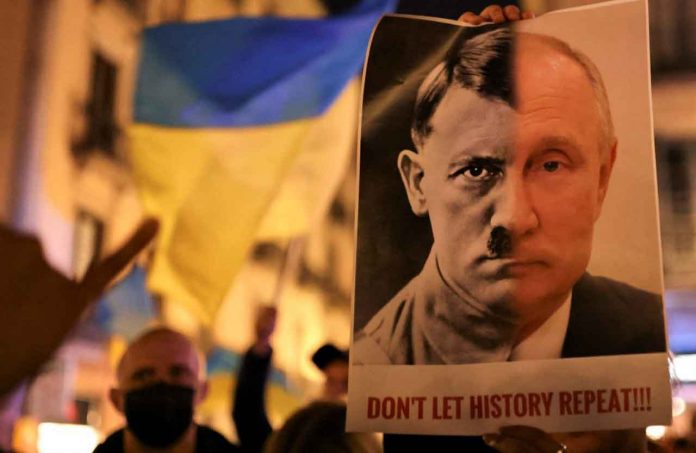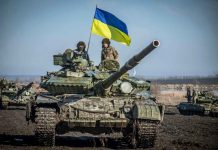Media is a strong tool at the disposal of any society. For many years, the Russian government had been using it to justify its politics. The Russian invasion of Ukraine was not an exception. Many in Russia support the invasion, but do they know at what cost?
Justification
February 24th was the beginning of Russia’s full-scale military attack against Ukraine, but was it an invasion? No, the invasion of Ukraine took place years earlier, when Russia had occupied Crimea and parts of the Donetsk and Luhansk regions in the east of Ukraine. Having proclaimed Ukrainian authority fascist in 2014, Russia however was watching the dramatic events unfold in Ukraine with great attention and scrutiny.
Ousting a president, who refused Ukraine its future in the EU, was reason enough for Putin to take steps to return the former Soviet republic into his hands.
Russia annexed Crimea and occupied Donbas. While Ukraine was trying to hold Russia accountable for its actions, Russia was celebrating the “reunification” with Crimea. While Ukraine was fighting Russian soldiers at its border, Putin was “saving” Russian-speaking people in the east of Ukraine.
Before the presidential elections in 2018, 80% supported the annexation, which made Putin an architect of the “new Russia”. The opposing figures in Russian politics knew that the novelty included more cruelty, expansion, and lies. Those who tried to speak up were killed or faced assassination attempts. Despite the fact that Putin’s opponents were too working with the press, he had managed to clear the path for further military advancements by concentrating on the Russian political elite and media.
Late in 2021, a large number of Russian troops were drawn to Ukraine’s borders. When the whole world was talking about a possible escalation of the war in Ukraine, Putin denied any military activity at the Ukrainian Northern border and remained silent on Russia’s military support for the puppet states in the East of Ukraine.
Russian press was also silent on this as they were silent on many issues of Russian politics since 2014. What Russian media were doing throughout these eight years was calling the Ukrainian government racist and discriminative of the Russian-speaking population of Ukraine. In this way, the Russian media was justifying the annexation of Crimea and occupation of the Ukrainian territory in the east, where a considerable part of the Russian-speaking population resided.
In January 2022, Russia demanded from NATO to never welcome Ukraine as its member. With Putin in the lead, the Russian media spoke about “threats” from the West resulting from NATO’s possible expansion to the east.
Having received a negative response to his ultimatum, Putin blamed Ukraine for non-compliance with Minsk agreements at the press conference with Macron a few weeks before attacking Ukraine.
The tensions between Moscow and Kyiv culminated in Putin’s recognition of the so-called DNR and LNR within the territories of the respective regions of Ukraine.
It wasn’t long until Putin announced the “special operation” in Ukraine to “bring peace” to Ukraine, which was broadcasted in the Russian media. Putin’s declaration of war against Ukraine met no public resistance and had little chance of doing so considering the declared “goodwill” of Putin’s regime. The first day of the Russian military attack against Ukraine showed that it was more than just an “operation”. What did the Russian media do?
Motivation
The following day after the invasion, the Russian Ministry of Defense announced zero casualties on their side. Their Ukrainian counterparts said that the numbers in Russian casualties approximated 800 persons. On the seventh day of the war, Russia declared 498 casualties, while Ukraine estimated 5840 Russian casualties. When Russian media used the word “war” for the first time to explain what was going on in Ukraine resulting from the Russian invasion, Kremlin blocked it.
In the meantime, Russian TV continued to spread the false rhetoric about ‘peace-making’ in Ukraine. Russian media signaled that Ukraine refused to negotiate with Moscow in Minsk, but it did not mention why.
For Kyiv, it was clear that there could be no agreement in Minsk, from where Russians launched missiles that fell on Ukrainian cities and towns killing hundreds of civilians and leaving them without water, electricity, and heat.
Official media channels in Russia are directly linked to the government.
They draw a picture for the Russian people by using ‘proper’ terminology like “Ukrainian neo-fascists”, “neo-Nazi government of Ukraine”, “the rights of the Russian-speaking population”, and so on. These media channels specifically focus on creating the rhetorical space for Kremlin’s lies by inviting “experts” who say what they think is going on in Ukraine.
One example may be a Russian talk show “60 minutes” presented by Olga Skabeeva, considered an ill-famed “journalist” in Ukraine. Inviting Ukrainians as their guests is quite popular, though very few agree. However, if they do so, they may find themselves yelled at by Skabeeva herself whenever they say something damaging to Putin’s regime.
Of course, media in Russia is not limited to talk shows targeting people’s emotions and common sense. There are news agencies broadcasting the events from all over the world. They remain less expressive but no more factual.
They may not use the word “fascist” in respect to the Ukrainian authorities, but they keep up with the official Kremlin’s storyline, according to which post-revolutionary Ukrainian government is illegitimate. There are multiple linguistic ways of making sure that Russian people think exactly this.
As we have seen, Kremlin’s propaganda has different platforms and formats. It is a way for Russian officials to hold on to the closed circle of decision-makers. Creating policy problems to shift people’s attention from the real issues of today’s Russia.
Another important element of the Kremlin’s propaganda is the antagonism with the West. NATO expansion is seen in Moscow as a threat to the regime. We’ve previously established that Putin sees Ukraine as an integral part of the so-called “Russkiy mir”, or the “Russian World”.
If Ukraine joins NATO, Putin will be left with Belarus as the only post-Soviet state who has neither NATO nor Chinese interests on the agenda. If NATO’s troops enter Ukraine’s borders, Putin will lose access to the Black Sea and the Mediterranean. While it may explain the Kremlin’s fear of NATO supremacy, it does not justify antagonism with the West at the cost of Ukrainian sovereignty.
Are there independent Russian media?
Answering this question may be difficult as there are several politically sensitive issues to this. For example, if you are a Russian citizen distributing the news, it may be easier to condemn Russian troops bombing the civilian population in Kyiv, Kharkiv, and other regions than to condemn Russian troops being stationed in Crimea.
The reaction of the international community to the Russian full-scale military attack on Ukraine had made it perfectly clear who is the villain, but the annexation of Crimea may be a distinct issue for the Russian people.
In a recent interview with “Nastoyashcheye Vremya”, a member of Zelensky’s office Oleksiy Arestovych said that Ukraine demands from Russia full withdrawal of Russian troops from its territory. When the TV presenter asked if Donbas was included, he replied “Donbas and Crimea”.
“Nastoyashcheye Vremya” and “Popular Politics” are not controlled by Kremlin. The former is being sponsored by the US Congress and the letter is being supported by Russian opposition leader Aleksey Navalny, so it is not a news agency in a classic way, but rather a political project.
“Popular Politics” is aimed at uncovering Kremlin’s lies and bringing up the truth about Putin and his subordinates. Working in an autocratic state with no place for political alternatives creates visible obstacles to the project. It is hard to say how “Popular Politics” is being perceived in Russia, but half a million people watch it on YouTube.
War
Ever since Putin has invaded Ukraine eight years ago, he was able to control the official storyline of his engagement in Donbas and Crimea. Everything he was saying about Ukraine in Russia was uncontested. He was in control of all Russian news agencies that told what he wanted his people to hear.
This created a vacuum of information, in which journalism became a corporal endeavor, where everyone spoke the same language (“fascist”, “neo-Nazi”, “oppressed Russian speaking population of Ukraine”).
Nothing of what Russian TV broadcasted about Ukraine was true. Moreover, it was being constantly debunked by the Ukrainian media.
This means that the Ukrainians knew what was going on in Russia, but the Russians did not know what was really going on in Ukraine. The same was in Europe, where there was no doubt that Russia annexed Crimea and occupied parts of Ukrainian territory in Donbas.
Such support was added to the century-long Russian tale of confrontation with the West. However, Ukraine was candid about its NATO aspirations ever since gaining independence in 1991.
With the conviction that in Ukraine the government is illegal and the people need Russian “support” to finally enjoy “peace”, Putin has ordered the invasion of Ukraine. However, Russian troops were met with resistance in all big cities and small towns in Ukraine. With the conflict dragging on and the president in hiding, will Putin be able to remain the leading voice in Russia?
Russian media is still silent on the war in Ukraine. Those news agencies trying to reach out to the Ukrainians for interviews and comments are not official in Russia and might be doing this for the first time since Russian military aggression against Ukraine. It is difficult to say, how helpful they will prove to be for Ukraine.
Ukrainian people suffer from a humanitarian crisis and are now in danger of a nuclear disaster ten times bigger than that of Chornobyl, the one which will directly influence Russians themselves. Is there any chance that Russian people will know about all this?
Ukraine has been actively fighting Russian propaganda. Now, the Ukrainians come up with ways of reaching out to the Russian people.
They have unblocked Russian social media (“VKontakte” & “Odnoklassniki”) in Ukraine to show what Russian troops are up to in Ukraine. Also, they have created hotlines for Russian relatives calling to know what is happening to their soldiers here.
Russians may encounter the truth about their country’s war against Ukraine from the press all around the world. Ukraine is now receiving an unprecedented level of global attention. There are demonstrations against the war in Ukraine in Russia. This means some Russians already understand the consequences awaiting them.
There’s no denying that the international tide of condemnation will make Russia take at least a glimpse at the situation in Ukraine and the whole world. The question remains, whether this glimpse is able to spur a national uprising against a person at whose orders thirty-eight Ukrainian children were killed in a little over than a week.
One thing remains clear, however. Putin’s regime has been holding a public opinion in Russia in its grips for over twenty years now and the media have been its main goal.
It has been aiding Putin’s war against Ukraine by justifying his actions and hiding the truth about their consequences for people in Ukraine, Russia, and the world. If there’s ever a time to put an end to this it is now and Russian media should be directly involved.
Article is provided by representatives of Kyiv-Mohyla University who have made their services available to provide accurate, timely, on-the-ground reporting about the war in Ukraine, including nuanced localized ongoing updates on what is happening across the country, as well as commentary and analysis.







